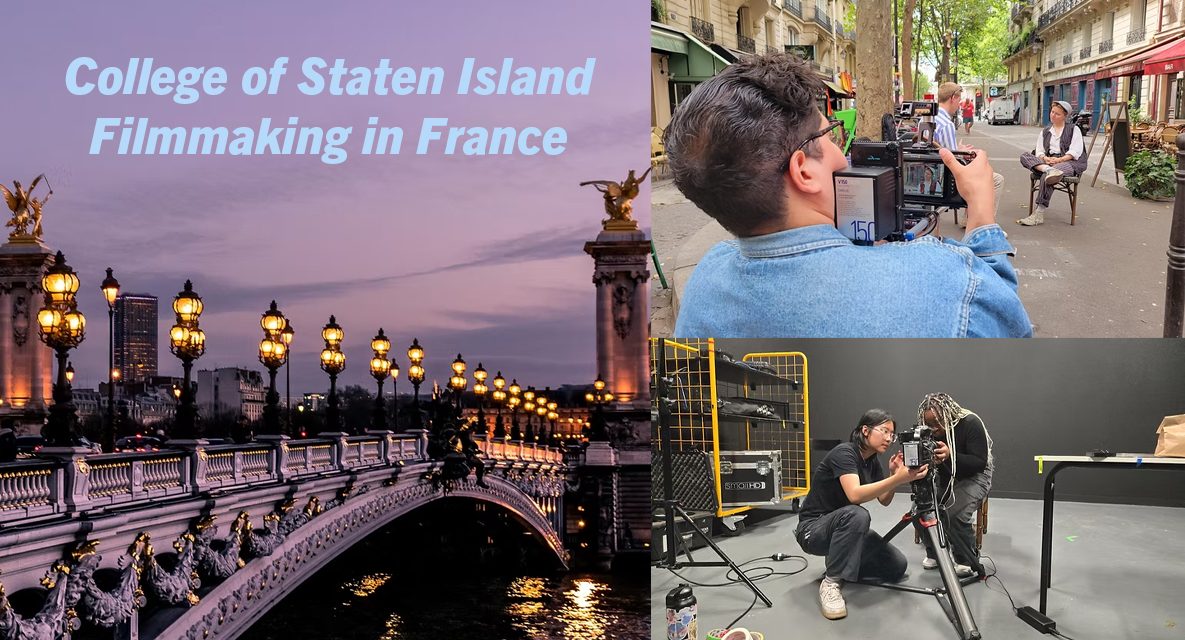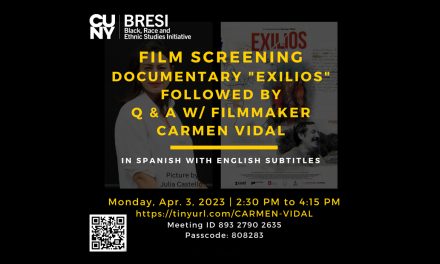When Professor David A. Gerstner first set foot in Paris in 2010, he wasn’t just sightseeing. He was scouting. He had already imagined something ambitious: a summer filmmaking program that would bridge students from the College of Staten Island with peers in France, where culture, language, and cinematic tradition would collide in creative experiment.
Now, that dream has a new digital home. The recently launched website CSI Filmmaking in France (csifilmmakinginfrance.com) offers a rich retrospective—its history, its people, its films—and invites visitors to walk through the program’s evolution, its challenges, and its artistic triumphs. It tells a story about more than teaching; it’s about building connections, stretching horizons, and the way art can travel.
From Idea to Reality
Putting together a study-abroad program around filmmaking is no small feat. As Professor Gerstner recounts on the site, the idea took shape slowly: meetings, questions, hesitation. What would funding look like? Would enough students commit? What institutional partners in France would be responsive? How could CSI balance the logistical, pedagogical, and creative demands?
Early steps were taken in 2010, when Gerstner visited EICAR—then based in Saint-Denis—and started imagining how a partnership might work. But momentum stalled, things remained up in the air for several years, as Gerstner and his allies explored possibilities, built contacts, and tried to find the right formula.
Then, around 2015, the project reignited. Key players stepped forward: Dr. Stephen Ferst (Director Center for Global Engagement at CSI), Mathieu Fournet (then-Director of Film & Media Studies with the French Embassy’s Cultural Services), and others including film scholars and French filmmakers. Together they helped unlock funding (notably a Trans-Atlantic Mobility Program Grant) and institutional partnerships. With that backing, the first program was launched in 2016 (in Tours), followed by another in 2018, then more recent ones in 2023 and 2025 based out of EICAR.
The Program
At its core, Filmmaking in France is a faculty-led summer exchange / study abroad program. CSI students (alongside students from a wide range of American institutions) spend time in France working side by side with French filmmakers and students. They learn filmmaking not just as technical craft—lighting, editing, direction—but immersed in another culture, with its cinematic histories and aesthetic sensibilities. Every other year, the roles reverse and the College welcomes French film students for study and filmmaking in NYC.
Participants benefit on many levels:
- Creative growth: learning and making films in Paris gives students chances to push themselves—visual style, narrative voice, even experimentation that might feel harder to attempt at home.
- Cultural immersion: seeing how French film schools operate, collaborating with French peers, dealing with everyday experiences while developing new filmmaking techniques in French settings brings new perspectives and texture to a filmmaker’s world view.
- Professional networks: faculty, organizations like EICAR, and cultural institutions like the French Embassy / Villa Albertine become more than names—they become collaborators and potential launching points for future projects related to French culture.
- Academic enrichment: the program connects well to CSI’s Department of Media Culture and the Center for Global Engagement, strengthening cross-border partnerships, engaging with students from other universities, and giving students international credentials to enhance their resumés.
“Filmmaking in France has proven not only as a means to strengthen technical skills with top-of-the-line film equipment at EICAR,” said Gerstner. “Students take those filmmaking skills into an unfamiliar environment where the diverse and culturally rich settings of Paris open their cinematic imaginations. Most importantly, the program allows students the freedom to discover new perspectives about themselves through the films they make and the people they meet.”
The New Website: A Window into the Journey
What the website does beautifully is make visible things that are often private or ephemeral: the films students made, the challenges behind the scenes, the gradual building of relationships, the changing personnel and places. Key features include:
- Retrospective sections for the years the program ran (2016, 2018, 2023, 2025), showing past films and portfolios of student work.
- Detailed “About the Program” pages that explain its origins, structure, and the roles of various people—Professor Gerstner, CSI faculty and administrators, French partners.
- Visuals—images of Paris, classrooms, students, film shoots—that give a sense of place and process.
- A sense of thanks and collaboration: acknowledgments to people at CSI, in France, grant-makers, faculty, and students.
Groundbreaking Work
What makes Filmmaking in France more than just another study abroad program is the depth of the partnership and the sustained commitment. CSI’s model, as laid out on the website, has shown persistence over nearly a decade, multiple editions, and evolving institutional support.
For the students, it’s transformative. There’s learning, but also confidence built by showing one’s work in international contexts, seeing one’s creative voice in conversation with French peers, and grappling with practical constraints that often inspire innovation. For CSI, there’s prestige and expansion: global engagement, new networks, experiences that draw students in, and faculty who gain research and artistic opportunities.
Macaulay Honors College and CSI Cinema Studies graduate Mitchell Lovell has been a part of the program since near-inception and is a valued partner with Prof. Gerstner as a College Lab Technician in the Department of Media Culture, and spoke first-hand of the invaluable experience the program offers.
“The program has been a highlight of my professional time here at CSI,” said Lovell. “I find that each iteration provides a new experience due to how we build upon the previous iterations and the uniqueness of offerings each student cohort brings. For a program that’s only three weeks long, it’s fascinating to see how students expand on their projects or even start new ones inspired by their experiences in France. Some students have decided to declare a cinema major, use the trip as basis for a senior thesis, or even seek work in Europe. Travelers on this program truly return with a wider understanding of the world and a more focused vision for their careers.”
On the site, the films themselves offer the best proof of the growth of the program. Each one carries marks of its makers’ curiosity: images of France seen through both outsider and insider eyes, storytelling that is personal and sometimes experimental. At the forefront is growth in the students’ technical skill, creative confidence, and ambition. Working in teams and groups furthers the immersive and collaborative spirit of the program.
Looking Forward
With the website now launched, there are new opportunities ahead. It’s a platform to showcase future student work, to archive the past, to help prospective students see what the experience is really like, to attract further support. International academic partnerships, cultural diplomacy, global learning—all are part of CSI’s trajectory—and Filmmaking in France sits squarely at that intersection.
In the end, what the CSI Filmmaking in France website offers is more than documentation. It is testimony—to what can happen when vision meets persistence, when students cross borders, when art is shared. For Gerstner, for Lovell, for the students, for CSI, this program has become a story worth telling, and now worth seeing.


















